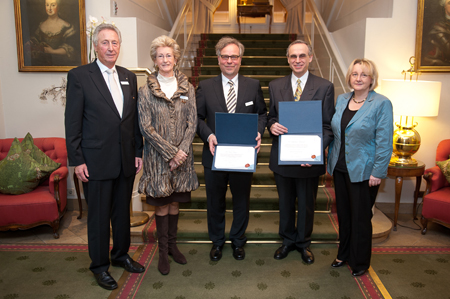Expanding the borders of knowledge and setting new standards
Science award of the Hector Foundation II goes to professors from Karlsruhe, Konstanz and Freiburg
HEIDELBERG/WEINHEIM. In 2012 three outstanding researchers received the Hector Science Award: Professor Hilbert von Löhneysen (Karlsruhe Institute of Technology), Professor Axel Meyer (University of Konstanz) and professor Nikolaus Pfanner (University of Freiburg).
Pfanner focuses his scientific research on the energy balance of living cells. He is specially fascinated by mitochondria acting like “cellular power plants” that provide energy and support life-sustaining functions. The biochemist was the first scientist worldwide in mapping the composition of mitochondria. In addition, professor Pfanner analyzes the way by which about 1,000 different mitochondrial proteins get to their destination, which bonds are formed in this process and how they are freed again. He also discovered molecular “pylori”, “locks” and “traffic policemen”, which control and monitor these processes.
Meyer is one of the world’s leading experts in the field of evolutionary biology. He established the empirical knowledge — and thus he refuted a decades-lasting textbook dogma — that speciation is possible without geographical barriers. He also pioneered the use of genetic data in evolutionary biology. His comparative analyses show that in the ancestors of all fish species there occurred a whole-genome duplication, and therefore fish initially had twice as many genes as land vertebrates. Linking the phenotype with genetic causes it can be deduced which genetic differences are responsible for style accommodation and differentiation.
Löhneysen is entering entirely new grounds by exploring the so-called quantum effects in metals. In the semiconductors of computer industry, electrons move almost independently in the laboratory. However, they showed strong interactions at absolute zero (- 273°C). Professor von Löhneysen investigates the transitions between the states in these materials, e.g. the transition from conducting to isolating and from magnetic to nonmagnetic. Doing this, he discovered a new type of quantum phase transitions. These features bring great benefits for electrical contacts and construction elements, the interactions between electrons play an important role in their metallic nanostructures. On this basis, among other things, new, more powerful computer systems are conceivable.


